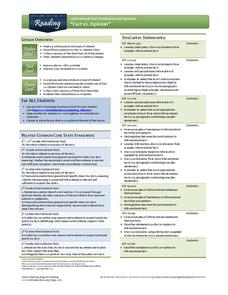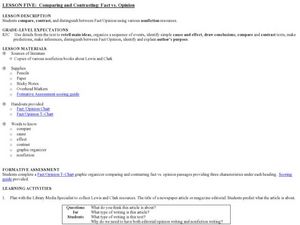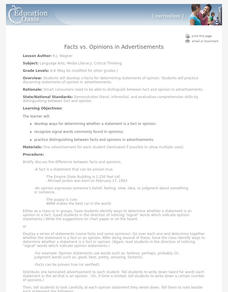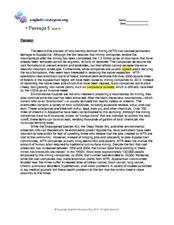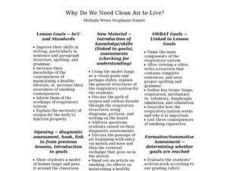Curated OER
Fact vs. Opinion (Part II)
How can you tell the difference between fact and opinion? Using newspapers, learners determine which articles contain statements of fact, and which articles reflect the writer's opinion. The lesson plan includes a discussion format and a...
For the Teachers
Fact vs. Opinion
Many informational texts are written as factual, but can your learners determine when an opinion is presented as fact? Have your kids read several articles on the same topic and record the statements that contain either facts or...
Curated OER
Comparing and Contrasting: Fact vs. Opinion
Elementary schoolers investigate nonfiction stories by analyzing facts and opinions. They read nonfiction stories about the Lewis and Clark expedition. Pupils utilize a T-chart to list the facts and opinions on opposite sides, and then...
Curated OER
Facts vs. Opinion (Part 1)
Provide pairs of learners with a three-page Fact vs. Opinion packet. The first page of the packet provides a definition of these terms and an opportunity for guided practice. Partners then share their ideas to complete the practice...
PBS
Facts vs. Opinions vs. Informed Opinions and their Role in Journalism
Do reporters write about what they see, or what they think? Examine the differences between investigative writing and opinion writing with a lesson from PBS. Learners look over different examples of each kind of reporting, and convince...
Curated OER
Fact and Opinion: How to Tell the Difference
Young scholars explore reasoning by completing a worksheet activity in class. In this fact vs. opinion lesson, students identify the differences between a personal opinion and something that is factually true. Young scholars identify...
Curated OER
Fact vs. Opinion: Theory, Hypothesis, and Bias
Emphasize the differences between a theory and a hypothesis to teach your class how to avoid scientific bias.
Curated OER
Fact or Opinion?
In this fact or opinion worksheet, students fill in the graphic organizer with a statement of a fact and their opinions about the fact. Students complete 4 sections.
Freeology
Fact vs. Opinion
Fact or opinion? That is the challenge facing learners who must record statements from a passage in either the fact or opinion column on a one-page template.
Curated OER
Fact vs. Opinion
Students explore fact versus opinion in reading material. They listen to sentences and use hand signals to identify if the sentences are facts or opinions. After reading a story, they vote on sentences for facts and opinions and stae a...
Curated OER
Facts vs. Opinions in Ads
Students develop criteria for determining statements of opinion. They practice discerning statements of opinions in advertisements.
Curated OER
Persuasive Writing Skills Worksheets
What makes you want to buy that new car? Or vote for that popular politician? Study the persuasive techniques commonly found in advertisements or argumentative writing, including repetition, exaggeration, and fact vs. opinion.
Curated OER
In Legal Limbo
Newspapers are great learning tools. They act as a conduit for current events, reading comprehension, and critical thinking. Here, pupils read a New York Times article regarding US immigration law under the Obama administration and...
Curated OER
The Value of Facebook
Does Facebook actually have any value? Find out what the New York Times thinks by reading this informational article. Learners use the 10 guiding questions to aid them as the read the provided article regarding the value of Facebook. Two...
Scholastic
Reading Skills Profile
Assess your young learners' reading skills, from sounding out words to general comprehension and identifying facts vs. opinions, with this excellent worksheet. The resource also includes a goal-setting worksheet that focuses...
Curated OER
Amelia Earhart: Fact Or Myth
In this reading and history instructional activity, students research Amelia Earhart and make lists of what they believe to be facts and what they think are myths, legends and theory. No information or examples are given on this page.
Curated OER
Turning Literature into News
Students examine the newspaper. In this writing purposes lesson, students read the newspaper and discuss the purpose: to inform, entertain and persuade. Students identify facts and opinions. Students write an article and discuss acts of...
Curated OER
Reading Comprehension 5: Level 10
Whether used as a reading comprehension assessment, as the basis of a mini-lesson on reading strategies, or as extra practice, this exercise will prove to be valuable because of the answers and explanation key that accompanies the...
Curated OER
Robinson vs Barlow and the White Indians: A Trial
Young scholars judge the actions of Nathan Barlow and the White Indians by putting them on trial in the classroom. They discuss how public opinion can change based on time. Students judge the White Indians based on the early 1800's not...
Curated OER
bbc news: school report
In this language arts/social studies worksheet, learners rank on a scale of 1 to 10 , twelve different news sources. Students rank them according to reliability, and then provide an example of each kind of news source. There is one...
Curated OER
Don't Let the Earth Down
Writing a persuasive argument starts with a clear thesis. Using this resource, your class will write a persuasive paper on a conservation issue. They will then transform their argument into a 30-second public service announcement. If...
Curated OER
Conservation vs. Economic Growth
Investigate the choices people make between economic growth and personal growth and development using the ethical/decision making model. Small groups create and present a position paper describing their feeling for or against the...
Curated OER
Bias vs. Perspective: An Inevitable Aspect of Journalism?
Students explore the types of media that U.S. teens prefer the ways in which viewers identify and account for journalistic bias. They explore the ways in which media shapes one's opinion or affects their judgment.
Curated OER
Why Do We Need Clean Air to Live? - Biology Teaching Thesis
Students name the main components of the respiratory system. They write a reaction that contains complete sentences, and uses proper spelling and grammar, after viewing a video. Students define the following terms: lungs, respiration,...
Other popular searches
- Teaching Fact vs. Opinion
- Fact vs. Opinion Books
- Teaching Fact vs Opinion
- Fact vs. Opinion Reading
- Fact vs. Opinion Advertising
- Fact vs Opinion Advertising
- Fact vs. Opinion Worksheets
- Fact vs Opinion Reading
- Fact vs Opinion Passages
- Fact vs Opinion Books
- Fact vs Opinion Literacy
- Fact vs. Opinion Website



